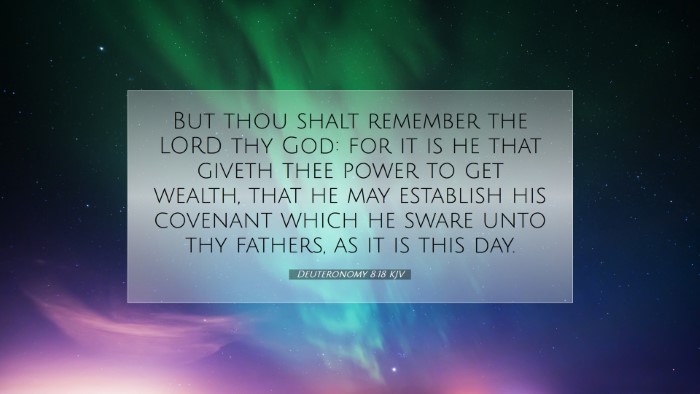Commentary on Deuteronomy 8:18
Verse Text: "But thou shalt remember the LORD thy God: for it is he that giveth thee power to get wealth, that he may establish his covenant which he sware unto thy fathers, as it is this day." - Deuteronomy 8:18
This verse is crucial for understanding the relationship between God and His people, particularly concerning the notion of wealth, prosperity, and divine covenant. The emphasis here is not only on the remembrance of God but also on His role as the giver of ability and resources. The following commentary will extract insights from Matthew Henry, Albert Barnes, and Adam Clarke to provide a comprehensive understanding of this significant passage.
Historical Context
Matthew Henry emphasizes the context of Deuteronomy as a farewell address by Moses to the Israelites as they prepare to enter the Promised Land. It serves as a reminder of God's faithfulness and the necessity for Israel to foster a continual awareness of God’s grace and provision.
The Call to Remember
Albert Barnes notes that remembrance in this context is not merely cognitive but implies action and response. The command to "remember" serves as a call for the Israelites to actively acknowledge God’s past interventions in their lives and remain grateful. In forgetting God, they risk spiritual dilution, leading to reliance on their own strength rather than divine assistance.
Implications for Modern Believers
For the contemporary church, this reminder of God's provision and historical deliverance is vital. Believers are called to reflect regularly on their spiritual journey and the blessings received, ensuring that gratitude shapes their daily lives.
God as the Source of Wealth
Adam Clarke elaborates on the phrase “he that giveth thee power to get wealth.” He underscores the divine origin of all natural abilities and resources. Wealth, according to Clarke, should be perceived as a means to fulfill God’s purposes, rather than as an end in itself.
Theological Implications
Theologically, this verse suggests that God is intimately involved in the financial and material prosperity of His people. Wealth can be seen as both a gift and a stewardship opportunity. Rather than fostering pride, the awareness that God grants the ability to accumulate wealth should cultivate humility and generosity among believers.
Covenant Significance
Matthew Henry also highlights that this ability to prosper is not arbitrary; it is bound to God’s covenant with His people. The phrase “that he may establish his covenant” indicates that prosperity is part of God's plan to maintain His relationship with His people, affirming His promises made to the patriarchs.
Covenantal Theology
The concept of covenant is pivotal in understanding the dynamics of God’s relationship with Israel. The blessings, including wealth, are intertwined with obligations; thus, success is coupled with responsibility towards God’s commandments and the welfare of the community.
Exhortation Against Complacency
The verse carries an inherent warning against complacency and arrogance. Albert Barnes cautions that success can lead to a false sense of self-sufficiency. "Lest thou say," the passage suggests, indicates a preemptive warning against the mindset that credit for success can be assigned exclusively to oneself.
Contemporary Applications
For today’s believers, the call is to remain humility in the face of success. Wealth can easily lead to a self-reliant attitude, distancing oneself from dependence on God. This admonition serves as a timeless reminder to maintain a posture of gratitude and acknowledgment of God’s role in one’s achievements.
Practical Application
Adam Clarke emphasizes that the faithful steward recognizes the hand of God in all matters, including the ability to secure financial success. This understanding encourages not only personal humility but also the encouragement of communal sharing of resources within the body of Christ.
Encouragement for Generosity
- Promote community outreach: In light of recognizing God’s blessings, pastors and church leaders should encourage acts of charity and service to others as extensions of God’s grace.
- Teach stewardship: Equip congregants with teachings on financial stewardship, reflecting biblical principles of generosity and responsible management of resources.
- Regular account of blessings: Foster a culture within the church where members share testimonies of God’s provision, reinforcing the importance of collective appreciation.
Conclusion
Deuteronomy 8:18 serves as a profound reminder of the relationship between divine provision, human responsibility, and the faithfulness of God’s covenant. The combined insights from Matthew Henry, Albert Barnes, and Adam Clarke highlight the significance of remembrance, the nature of true wealth, and the importance of humility and gratitude. As believers engage with this text, they are called to recognize God as the ultimate source of their prosperity and to live lives that honor His gifts.


